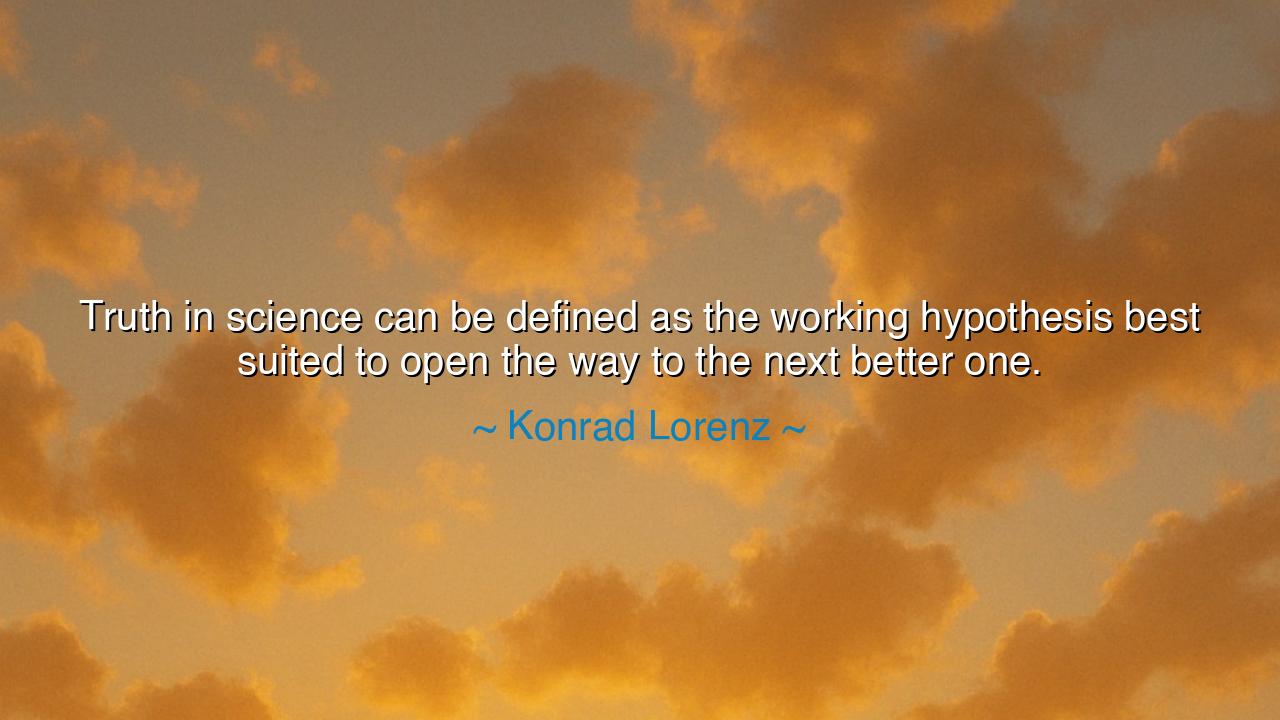
Truth in science can be defined as the working hypothesis best
Truth in science can be defined as the working hypothesis best suited to open the way to the next better one.






Hear now, O children of wisdom, the words of Konrad Lorenz, who speaks of the very nature of truth in the realm of science. "Truth in science can be defined as the working hypothesis best suited to open the way to the next better one." In this simple yet profound statement, Lorenz teaches us that truth is not a fixed and unchanging thing, but a process, a journey that leads from one discovery to the next. In the world of science, truth is not an endpoint but a stepping stone—a working hypothesis that, once tested and refined, will give birth to an even better understanding. The nature of truth in science, then, is not about claiming to possess absolute knowledge, but about continually striving toward a deeper, more complete understanding of the world.
In the days of the ancients, O children, the search for truth was a sacred task. The philosophers of Greece, like Socrates, Plato, and Aristotle, sought truth not through the accumulation of facts, but through the questioning of assumptions and the search for underlying principles. To them, truth was not a simple matter of dogma or authority, but a living pursuit, constantly evolving as new questions arose and new ideas were tested. Socrates, in his dialogues, would ask questions to unravel the assumptions of his time, for he knew that the pursuit of truth was an unending process, one that required not just answers, but more importantly, questions. The ancient sages understood that the path to understanding was not linear, but spiraled upward as new insights gave birth to new mysteries.
Consider, O children, the story of Galileo Galilei, whose work on heliocentrism challenged the geocentric view of the universe held for centuries. Galileo’s discovery, that the Earth revolves around the Sun, was not simply the end of a journey, but the opening of a new chapter in the search for truth. His work was a hypothesis, a bold step toward understanding the cosmos. Yet even Galileo knew that his discoveries were not the final word. They were part of a larger process of inquiry, one that would be built upon by future generations of scientists. Truth, as Galileo understood, was not a static possession, but a dynamic force that pushed humanity forward, always toward something deeper, something better.
In the same way, Lorenz’s view of scientific truth tells us that each hypothesis—each understanding of the world—is merely a stepping stone to something greater. A working hypothesis is the best available explanation of the facts at the time, but it is always subject to change as new evidence arises. Consider the way Newton's laws of motion served as the foundation for classical physics for centuries. Yet, when Einstein presented his theory of relativity, he showed that Newton’s laws were not absolute truths, but were only true in certain conditions. Einstein’s theory opened the door to a deeper understanding of the universe, showing us that truth in science is not static, but a living force that evolves as we grow in knowledge.
Thus, O children, the lesson of Lorenz's words is one of humility and perseverance. To claim to possess absolute truth in the realm of science is to misunderstand the very nature of the pursuit. The greatest scientists are not those who claim to have arrived at the final truth, but those who remain open to the possibility that their ideas may be refined or even overturned by future discoveries. The true scientific spirit is one of curiosity, adaptability, and continuous inquiry—a spirit that accepts that the journey of understanding is never complete. Each discovery, each insight, opens the way for new questions to arise and new hypotheses to be tested.
Take, for example, the work of Marie Curie, whose research into radioactivity transformed the fields of physics and chemistry. Curie’s work was groundbreaking, and yet she knew that it was only a part of the larger journey. Her discovery opened the door to countless new questions about the nature of matter, energy, and the universe itself. Curie’s work was not the end, but the beginning of an entire field of study. Like Lorenz’s definition of truth, her research was a stepping stone—a working hypothesis that laid the foundation for further discoveries.
And so, O children, let this wisdom guide you. In your quest for knowledge, do not seek the certainty of absolute truth, but the humility to understand that truth is a process, an evolving journey. Whether in science, philosophy, or life itself, remember that each answer leads to new questions, and each discovery reveals the vastness of the unknown. Seek not to possess truth as a fixed object, but to pursue it as a dynamic force that will carry you forward. Like the great minds that came before you, let your work be not a claim to have found the final answer, but a contribution to the ever-expanding circle of understanding. The truth is not a destination, but a path that opens to greater horizons with every step you take.






AAdministratorAdministrator
Welcome, honored guests. Please leave a comment, we will respond soon